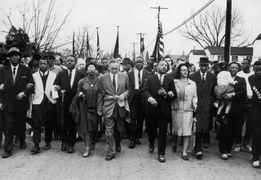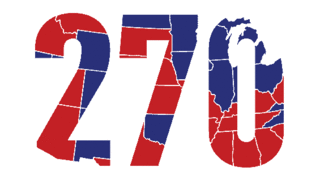Electoral College = Minority Rule
Answer- 113,999,959 or 114,000,000 loser vs 41 winner
Question- What is the largest difference in voter margin possible when the winner of the Electoral College loses the popular vote.
As we sit and ponder how one candidate
who received nearly 4 million more votes than
the other candidate can win by just the narrowest
in the Electoral College.
The answer is rather simple if one looks at the mathematical foundation
of the system used to elect our president.
It could be a whole lot worse.
Is it easier to get the support of 41 people or 114 million people?
The mathematical structure of the Electoral College makes this a reality;
Unity=loser Division=Winner
The above scenario is based on the following set of assumptions:
The winning candidate gets the support of 1 voter from each of the
41 smallest states. Putting them at 282 Electoral Votes
The losing candidate gets the support of 100% of registered voters
from the 10 largest states putting them at 256 Electoral Votes.
Seems outrageous? That is a emotional value judgement, it wouldn't
carry much weight in front of SCOTUS.
This particular scenario is an extremely unlikely one,
but there is a whole lot of grey area in-between.
Remember:
1. The SCOTUS is dominated by "Originalist" who claim to stick
to the text of the Constitution vaguely tempered in some way
by their own individual interpretation of the mores during the
time the Constitution was written.
2. The Constitution does not dictate that Electors are selected
by means of the popular vote. So in theory a state could assign
one person to decide who their Electoral votes will go to or simply
have such extreme voter suppression that only one person is qualified
to vote.
3. The Constitution does allow states to select their Electors via
popular vote if they chose to. (Most states do that now, but it is not
required).
Conclusion: based on this, someone like Trump is simply a product
of the Electoral System under which someone like him prospers. There will
be others like Trump even if he loses this particular election because
the mathematical structure of the Electoral College favors dividers over
uniters.
That is why phrases like: Southern Strategy, Welfare Queen, Red States vs Blue States,
Coastal Elites, Fly-over country, "we're a republic not a democracy",
systemic racism, gerrymandering, small state senators, the 2nd amendment,
pro-life, etc, etc have featured so prominently in our political discourse.
Our country has gone through many decades where the winner of the overall
popular vote has usually ended up as the winner of the presidential
election. This is because most states select their Electors via popular vote
and only practice minimal voter suppression strategies, but this is a rather
naïve approach. Once more candidates for elected office see the advantages
of gaming a poorly designed electoral system this will get worse.
If I wanted to game the system; my bedrock policy would be to tax the
10 largest states and give that money to the 41 smallest states (including DC)
(or alternatively you could do the opposite).
But before that, I'd make sure I belonged to the party that controlled the
majority of small states. That party would then get the legislatures of each
state to decide where its Electoral Votes would go rather than the popular vote
or practice extreme voter suppression. If you think about it the Republican party
is well on its way to achieving this goal.
The Electoral College’s Racist Origins
For centuries, white votes have gotten undue weight, as a result of innovations such as poll taxes and voter-ID laws and outright violence to discourage racial minorities from voting. (The point was obvious to anyone paying attention: As William F. Buckley argued in his essay “Why the South Must Prevail,” white Americans are “entitled to take such measures as are necessary to prevail, politically and culturally,” anywhere they are outnumbered because they are part of “the advanced race.”) But America’s institutions boosted white political power in less obvious ways, too, and the nation’s oldest structural racial entitlement program is one of its most consequential: the Electoral College.
Of course, the Framers had a number of other reasons to engineer the Electoral College. Fearful that the president might fall victim to a host of civic vices—that he could become susceptible to corruption or cronyism, sow disunity, or exercise overreach—the men sought to constrain executive power consistent with constitutional principles such as federalism and checks and balances. The delegates to the Philadelphia convention had scant conception of the American presidency—the duties, powers, and limits of the office. But they did have a handful of ideas about the method for selecting the chief executive. When the idea of a popular vote was raised, they griped openly that it could result in too much democracy. With few objections, they quickly dispensed with the notion that the people might choose their leader.
But delegates from the slaveholding South had another rationale for opposing the direct election method, and they had no qualms about articulating it: Doing so would be to their disadvantage. Even James Madison, who professed a theoretical commitment to popular democracy, succumbed to the realities of the situation. The future president acknowledged that “the people at large was in his opinion the fittest” to select the chief executive. And yet, in the same breath, he captured the sentiment of the South in the most “diplomatic” terms:
There was one difficulty however of a serious nature attending an immediate choice by the people. The right of suffrage was much more diffusive in the Northern than the Southern States; and the latter could have no influence in the election on the score of the Negroes. The substitution of electors obviated this difficulty and seemed on the whole to be liable to fewest objections.
Which US states make it hardest to vote?
The hardest places to vote in America, considering the strictness of voter identification laws, voter roll purges and felon disenfranchisement.
Is America a democracy? If so, why does it deny millions the vote?
The United States is ranked 57th in electoral integrity in the world. Compared to other liberal democracies, it is ranked second to last.
These copycat bills on Sharia law and terrorism have no effect. So why do states keep passing them?
The use of copy-and-paste legislation – on topics as varied as asbestos liability and used car sales – is the subject of an investigation by USA TODAY, the Center for Public Integrity and The Arizona Republic. USA TODAY and the Republic found that at least 10,000 bills almost entirely copied from model legislation were introduced nationwide in the past eight years, and more than 2,100 of those bills were signed into law. In a separate analysis, the Center for Public Integrity identified tens of thousands of bills with identical phrases, then traced the origins of that language in dozens of those bills across the country.
How to Game the US Electoral System (Electoral College Version)
How to Game the US Electoral System by Kirk Garber 03/2019
The Electoral College has two major weaknesses as an electoral system so I simply calculated the worst case scenario assuming these two weaknesses were taken to their extreme.
1- It incentivizes voter suppression, so if only one person votes in a state, that person's choice receives all of the Electoral College votes. 2 It's formula for deciding how many Electoral Votes are allotted to each state favors small states over large states (by population). So---- if there is only one person from each of the 41 smallest states (including DC) voting and those 41 people all vote for Candidate #2, that candidate would receive 282 Electoral votes, enough to win the Presidency. It wouldn't matter if all the registered voters from the 10 largest states- 81,000,000 (vs 76,600,000 in the 41 smallest states with DC) vote for Candidate #1, their votes are tossed out.


